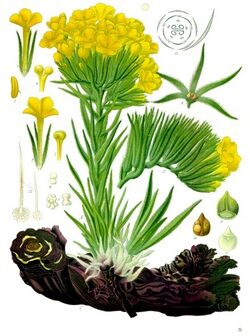Biology:Arnebia densiflora
| Arnebia densiflora | |
|---|---|

| |
| Scientific classification | |
| Kingdom: | Plantae |
| Clade: | Tracheophytes |
| Clade: | Angiosperms |
| Clade: | Eudicots |
| Clade: | Asterids |
| Order: | Boraginales |
| Family: | Boraginaceae |
| Genus: | Arnebia |
| Species: | A. densiflora
|
| Binomial name | |
| Arnebia densiflora (Ledeb. ex Nordm.) Ledeb.
| |
Arnebia densiflora, (also called Macrotomia cephalotes) is a plant species belonging to the family Boraginaceae. It is native to Greece and Turkey. Arnebia densiflora has been investigated for its wound-healing abilities.
Description
Small clump-forming from a robust, somewhat woody rootstock with erect, hispid, unbranched stems 25-40cm high. Basal leaves linear elliptic to narrowly lanceolate, 10-15cm long with stalks to 4cm; stem leaves smaller and sessile, velvety-hairy. Flowers are yellow, 3.5-4.5 cm long by 1.2-1.6 cm across densely planted on the ends of stems and branches. It flowers from early to late summer. All aerial parts are pubescent.[1]
Habitat
Arnebia densiflora prefers mountain areas and places with dry and sunny rocky soils. It is native to Greece and Turkey on volcanic or limestone slopes and cliffs at 750-2600m.[1]
Medicinal use
Arnebia densiflora has been investigated for its wound healing abilities.[2]
Arnebia densiflora is one of the five species of Boraginaceae family grown in Turkey.[2] Several species of Boraginaceous plants are used as folk medicine in Turkey and eastern Mediterranean countries.[2]
The pigmented root of Arnebia densiflora, known locally as ‘Eyilik,’ is added to olive oil and applied on open wounds and cuts in Anatolia.[2]
In Malatya, roots of Arnebia densiflora are dipped in butter.[2] After removing the root pieces the butter is mixed with beeswax to prepare an ointment for open wounds.[2] Roots of Arnebia densiflora are also used as a natural-dye to color Anatolian carpets.[2]
The medicinal effect might have to do with the high naphthoquinone content in the roots barks.[2]
Taxonomy
Arnebia densiflora was first described by Carl Friedrich von Ledebour.[3]
It was first published in Flora Rossica Enumeratio sive Plantarum in Totivs Imperii Rossici Provinciis europaeis, Asiaticis, et americanis Hucusque Observatarum 3 (1.8): 140. 1847 [1]
Etymology
Arnebia : generic name derived from the Arabic name shajaret el arneb .
densiflora : Latin epithet that means "dense of flowers".[4]
Synonyms
- Lithospermum densiflorum Ledeb.
- Macrotomia cephalotes (A. DC.) Boiss.
- Macrotomia densiflora (Ledeb.) McBride[5]
References
- ↑ 1.0 1.1 1.2 "Tropicos". http://legacy.tropicos.org/Name/4002131.
- ↑ 2.0 2.1 2.2 2.3 2.4 2.5 2.6 2.7 Akkol, Esra Küpeli; Koca, Ufuk; Peşin, Ipek; Yılmazer, Demet; Toker, Gülnur; Yeşilada, Erdem (2009). "Exploring the wound healing activity of Arnebia densiflora (Nordm.) Ledeb. by in vivo models". Journal of Ethnopharmacology 124 (1): 137–141. doi:10.1016/j.jep.2009.03.019. PMID 19500923.
- ↑ "Catalogue of Life: 2014 Annual Checklist". http://www.catalogueoflife.org/annual-checklist/2014/details/species/id/16696319.
- ↑ "Dictionary of Botanical Epithets". http://botanicalepithets.net/dictionary/dictionary.76.html.
- ↑ "The Plant List". http://www.theplantlist.org/tpl/record/kew-2652976.
Wikidata ☰ Q2863301 entry
 |

